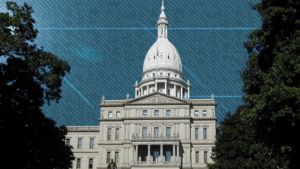The United States Supreme Court ruled in favor of a web designer who declined to work with a same-sex couple.
The graphic designer Lorie Smith is a Christian who argued being forced to work with a same-sex couple because of the Colorado Anti-Discrimination Act laws was a violation of her First Amendment rights.
“Ms. Smith seeks to engage in protected First Amendment speech; Colorado seeks to compel speech she does not wish to provide,” stated the Court in its opinion, which was released on June 30. “If she wishes to speak, she must either speak as the State demands or face sanctions for expressing her own beliefs, sanctions that may include compulsory participation in ‘remedial . . . training,’ filing periodic compliance reports, and paying monetary fines. That is an impermissible abridgement of the First Amendment’s right to speak freely.”
Smith, who owns and operates 303 Creative, filed a lawsuit in district court challenging the law. She had not been approached by a same-sex couple to create a wedding website but rather preemptively sought to determine if the state would compel her to in the name of enforcing anti-discrimination laws.
The Supreme Court agreed to hear the case even though critics of the lawsuit complained of its hypothetical nature.
“Like many States, Colorado has a law forbidding businesses from engaging in discrimination when they sell goods and services to the public. Laws along these lines have done much to secure the civil rights of all Americans,” wrote Justice Neil Gorsuch for the 6-3 majority. “But in this particular case Colorado does not just seek to ensure the sale of goods or services on equal terms.”
“As this Court has long held, the opportunity to think for ourselves and to express those thoughts freely is among our most cherished liberties and part of what keeps our Republic strong,” Gorsuch wrote. “The First Amendment envisions the United States as a rich and complex place where all persons are free to think and speak as they wish, not as the government demands.”
He said Colorado’s law “seeks to deny that promise” and the court therefore ruled to reverse the case.
Some reports have noted on the similarities between 303 Creative v. Elenis and the court’s 2018 decision in Masterpiece Cakeshop v. Colorado Civil Right Commission. In that case, the Court ruled a Christian baker had the right to refuse to create a wedding cake for a same-sex couple.
Justice Sonia Sotomayor wrote a dissenting opinion and was joined by Justices Elan Kagan and Ketanji Brown Jackson. Sotomayor also dissented to the 7-2 decision in Masterpiece Cakeshop v. Colorado Civil Rights Commission.
“Today, the Court, for the first time in its history, grants a business open to the public a constitutional right to refuse to serve members of a protected class,” wrote Sotomayor. “The law in question targets conduct, not speech, for regulation, and the act of discrimination has never constituted protected expression under the First Amendment. Our Constitution contains no right to refuse service to a disfavored group.”
She argued the ruling effectively issued a “license to discriminate” and symbolically marked “gays and lesbians for second-class status” – therein inflicting “a kind of stigmatic harm, on top of any harm caused by denials of service.”
“I fear that the symbolic damage of the Court’s opinion is done,” she continued. “The meaning of our Constitution is found not in any law volume, but in the spirit of the people who live under it. Every business owner in America has a choice whether to live out the values in the Constitution.”

